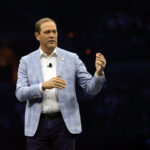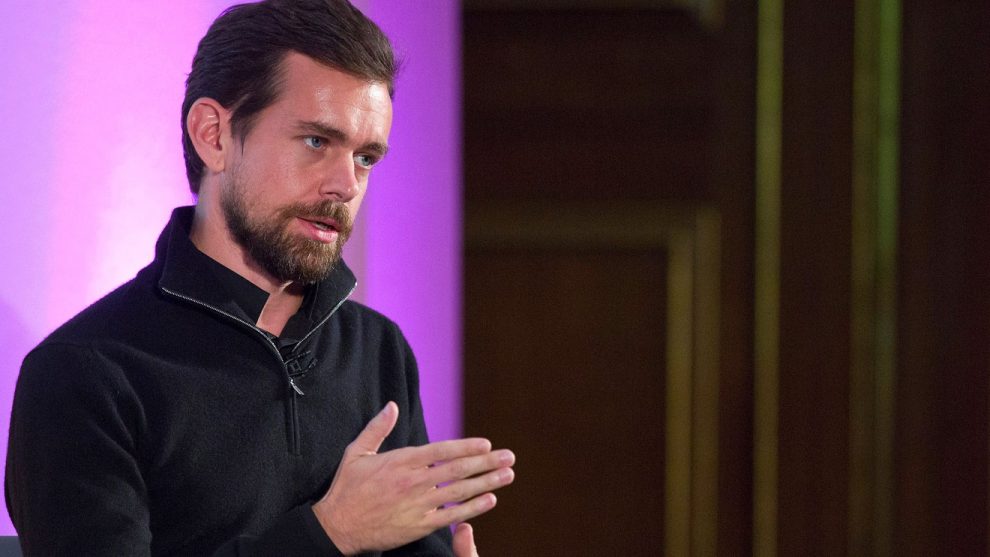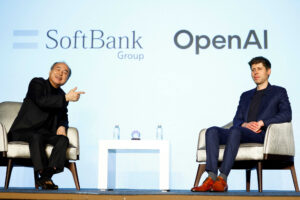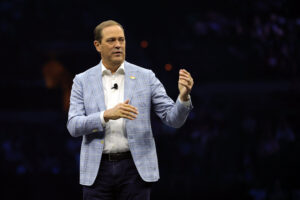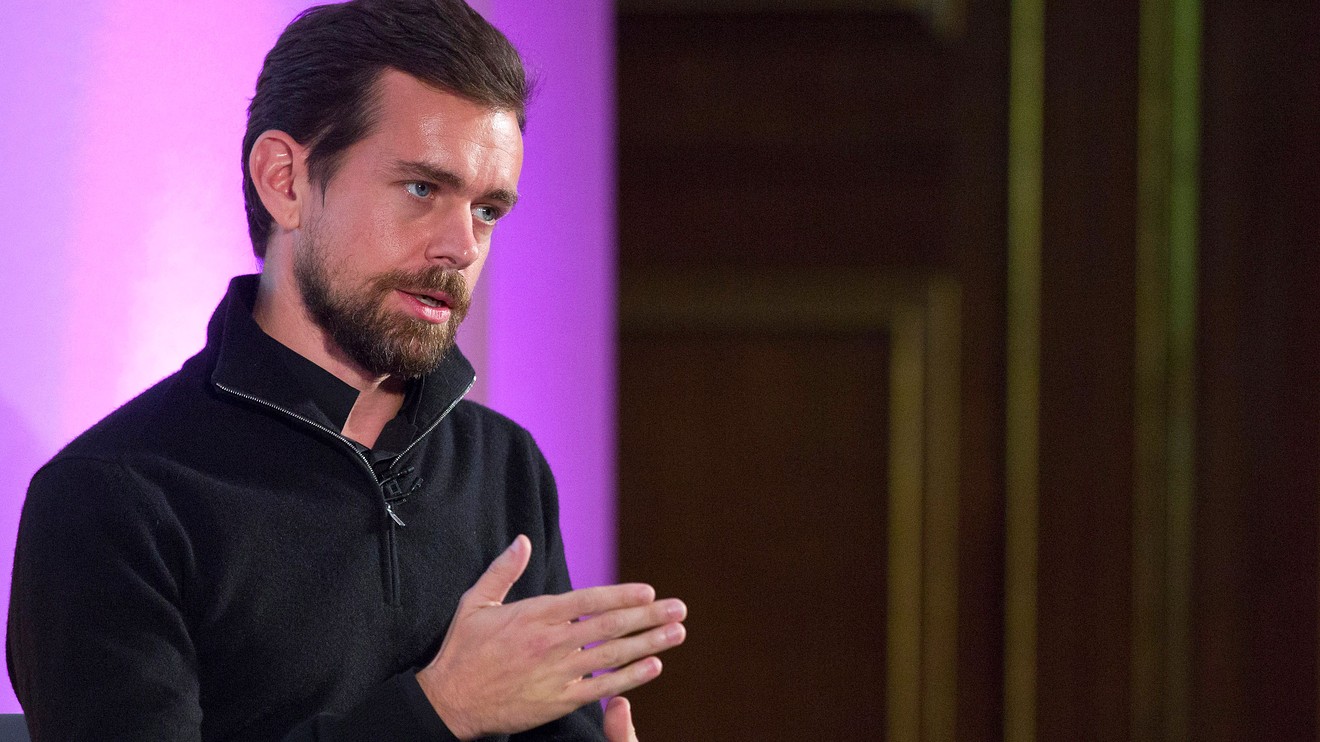
Jack Dorsey doesn’t eat much. And he wants you to know about it.
The CEO and co-founder of Twitter TWTR, -0.61% and Square SQ, -0.29% discussed his eating habits during a recent appearance on a podcast hosted by fitness entrepreneur Ben Greenfield. Dorsey described his experiences trying different diets — including strict veganism and the Paleo diet — before focusing attention on his current eating plan.
‘I’ll go from Friday ’til Sunday. I won’t have dinner on Friday. I won’t have dinner or any meal on Saturday.’
“For the past two years, I only have dinner,” Dorsey said. He eats between 6:30 p.m. and 9:00 p.m. The meal typically consists of a protein and lots of leafy greens. Sometimes he adds in another vegetable — asparagus or Brussels sprouts for instance. Dessert is usually mixed berries, or maybe dark chocolate. He also drinks wine.
On top of this limited, regimented diet, Dorsey also says he engages in longer fasts. “The other thing I’ve been playing with recently is not just a single day but doing weekends,” he told Greenfield. “I’ll go from Friday ’til Sunday. I won’t have dinner on Friday. I won’t have dinner or any meal on Saturday. And the first time I’ll eat will be Sunday evening.”
It’s not clear whether Dorsey’s dieting claims are merely designed to burnishes his eccentric “thinking outside the box” credentials of a Silicon Valley billionaire. It wouldn’t be the first time a public figure claimed to have unusual habits that others would find too difficult to maintain: The late Margaret Thatcher, the former British Prime Minister, was famously reported to only need four hours of sleep, which helped promote her reputation as “The Iron Lady.”
In 2019, diets are becoming more unusual as people look for ways to improve their performance, stay healthy and, well, lose weight. Dieting runs the gamut from macro dieters who count every nutrient and calorie, and people who buy low-calorie meal plans consisting of soups and smoothies to the low-carb Akins Diet and high-fat Keto Diet. There’s no shortage of pay-to-play online diet plans and diet books for those desperately searching for a way to lose weight — and keep it off.
Consumers are searching for that ‘secret sauce’ to living their best life
Dorsey’s reported diet plan may encourage consumers to believe there is a “secret sauce” to living their best life. People are willing to spend money in an attempt to find that perfect diet and, if that doesn’t work, the next diet that promises to answer all their problems. The U.S. weight loss industry was estimated to be worth $70.3 billion in 2018, up from $64 billion in 2014, according to market research firm Marketdata. Globally, the industry is estimated to be worth $3.7 trillion.
People are also choosing foods and meal times that they believe will help their mood and concentration. Much like the “biohackers” of Silicon Valley, the weight-loss industry is rebranding itself to move quietly away from the pressures and stigma associated with weight loss. The company long known as WeightWatchers rebranded itself in last fall as WW International WTW, -4.22% as a part of a shift away from “weight” to “wellness.”
When Weight Watchers began in the early 1960s, the company did not recommend skipping meals.
When it began in the early 1960s, WW International did not recommend skipping meals. “Dieting is so focused on what you lose … and what we were hearing from our members is that wellness is about what you gain,” Gail Tifford, WW’s chief brand officer, told MarketWatch last year.
WW’s spokesperson Oprah Winfrey continues invested in the company in 2015 and the stock soared in the months following that announcement. However, the company’s stock has tumbled 72% over the 12 months. (Comparatively, the Dow Jones Industrial Average DJIA, +1.03% and the S&P 500 SPX, +0.66% are up 7.9% and 9.1%, respectively, over the same period.)
Changing consumer sentiment is driving WW’s — and the weight loss industry’s — recent woes, analysts say. The share of people who are dieting has shrunk in recent years as people’s attitudes change towards health and the roles that food and diet play. (Twitter declined to comment on Dorsey’s diet. Square did not immediately return a request for comment.)
Is ‘biohacking’ a term that re-brands unhealthy eating habits for men?
This isn’t the first time Dorsey has discussed his unusual eating habits. In the past, he has posted to Twitter soliciting feedback about others’ experiences with intermittent fasting. “If this was any female celebrity, people would be jumping all over her saying she has an eating disorder,” said Abby Langer, a registered dietician based in Toronto, Canada.
Some have labelled Dorsey’s diet as problematic, but some coverage has taken a more aspirational bent. A CNBC article on Dorsey’s podcast appearance was originally titled “Billionaire Jack Dorsey’s 11 biohacks: From no food all weekend to ice baths.” (The article now carries a new headline, replacing the word “biohacks” with the phrase “‘wellness habits.”)
Dorsey is not the only person in Silicon Valley to engage in extreme dieting. It’s popular among workers, especially men.
But Dorsey is far from the only person in Silicon Valley to engage in extreme dieting. Intermittent fasting has been popular among workers (especially men) in the tech sector for years. Key to the diet’s appeal is placing it in the framework of so-called “biohacking,” an attempt to boost mental acuity and productivity.
Besides fasting, self-proclaimed biohackers also track vitals such as their blood sugar level and body composition, restrict their meals to beverages like Soylent and take supplements.
If Dorsey’s claims about his extreme dieting is true, Langer says such “biohacks” are not “wellness,” and not eating on the weekend is not representative of a healthy diet. “This whole biohacking thing is getting more and more crazy,” she said.
Dorsey tweeted in January: “Been playing with fasting for some time. I do a 22-hour fast daily (dinner only), and recently did a 3 day water fast. Biggest thing I notice is how much time slows down. The day feels so much longer when not broken up by breakfast/lunch/dinner. Any one else have this experience?”
Because successful men like Dorsey are promoting extreme dieting on social media, it’s gaining a wider foothold.
Because men like Dorsey, who have achieved success in business, are promoting these behaviors on social media, they are gaining a foothold. “When the general public sees men like that who are promoting a process like intermittent fasting, they say this clearly works, it’s endorsed by the 1%,” said Lindsay Kite, co-director of Beauty Redefined, a nonprofit devoted to promoting positive body image.
Yet the exact behaviors Dorsey and others are engaging are not considered healthy lifestyle choices among most health professionals and dietitians. The National Eating Disorder Association lists skipping meals, only eating small portions of food at regular meals and engaging in fad diets that cut out entire food groups as common symptoms of an eating disorder.
Also see: Soylent’s meal-replacement beverages are now in Walmart — but are they affordable?
“Wealthy white guys are re-branding something girls have been doing for decades,” Kite said. “We don’t need starvation and deprivation re-branded and sold back to us as biohacking. And we don’t need men to join us in deeply troubled relationships with food.”
While everyone faces pressure to be thin, Kite argues that women and girls bear the brunt of those expectations. And for women in the limelight that’s especially true.
‘Wealthy white guys are re-branding something girls have been doing for decades.’
Famous women have also faced accusations of having eating disorders when that’s not the case. Actress and “Modern Family” star Sarah Hyland has debunked claims that she is anorexic. In fact, she has said kidney issues led her to lose weight. Female actresses are regularly splashed across magazines and newspaper tabloids with headlines critiquing their bodies.
Oscar nominee Gabourey Sidibe has been outspoken about her frustrations with receiving kudos from fans and people on social media for losing weight. “It just annoys me because I’m just, like, don’t congratulate me on that. If you’re going to congratulate me on my weight loss, also congratulate me every time I pee,” Sidibe told online lifestyle news outlet Refinery29.
Men appear to suffer from eating disorders at a lower rate than women
Research has shown that nearly 1% of women have suffered from anorexia at some point in their lives, as compared with 0.3% of men. Research has suggested that men make up of just 10% of people who are treated for eating disorders, but also make up 40% of those who are diagnosed with binge eating.
Studies suggest that nearly 1% of women and 0.3% of men have suffered from anorexia.
For those who are struggling with disordered eating, help is available. The National Eating Disorder Association has a helpline, 1-800-931-2237, which people can call to find free resources available in their area. And organizations such as Project Heal provide scholarships to those looking to get treatment.
Society treats men and women’s bodies differently, Kite added. Women are often raised with expectations to look a certain way, and many of the women who struggle with eating disorders do so in silence. That Dorsey and others say they focus on diet not as a tool for weight loss, but as a way to be more mentally focused or productive, is not surprising, she added.
Yet for all their talk of how fasting is good for your mental faculties, the subtext is clear: It keeps you thin. “If those men looked different, no one would be cheering,” Kite said. “This is popular because of our cultural obsession with thinness.”
Social media has become ground zero for negative body image
There’s an added irony that Dorsey is endorsing behaviors associated with eating disorders, given the role that social media now plays in promoting these unhealthy habits, experts say. In recent years, sites like Instagram FB, +0.90% and Pinterest have been forced to grapple with the proliferation of content designed to encourage eating disorders.
Instagram, for instance, has been forced to ban and moderate specific hashtags that are used to share “pro-ana” (pro anorexia) content, including #thinspiration and #thighgap. Despite these efforts, pro-eating disorder content commonly evades social media sites’ filters. Research has also shown that social-media use is linked with body image concerns.
‘A healthy diet is also about people’s attitude toward food and how they’re eating.’
Complicating matters when it comes to fad diets like intermittent fasting is the fact that some research — and news articles based on those studies — have suggested they could be useful tools in achieving healthy weight loss.
But as experts note, the studies providing leverage for fad diets is far from conclusive. Many of these studies have been performed with mice or rats, not with humans. And even the studies done with people are limited: Many have small sample sizes that are not representative of the broader public and take place for too short of a period of time to prove whether these diets work in the long-term.
There are also some who have argued that weight loss may be a fool’s errand — not only not achievable for most people, but also a dangerous pursuit.
One way to start is by looking at what you should add to your diet — many studies have shown people don’t eat enough fruits and vegetables — rather than focusing on what to eliminate. And before starting any new eating approach, Lang encouraged consumers to get a second opinion from a doctor, registered dietician or psychologist.
There are ways to shift one’s approach to food and pursue a healthier lifestyle. “People think that a healthy diet is only what they put in their mouths,” Langer said. “But a healthy diet is also about people’s attitude toward food and how they’re eating.”
Get a daily roundup of the top reads in personal finance delivered to your inbox. Subscribe to MarketWatch’s free Personal Finance Daily newsletter. Sign up here.



